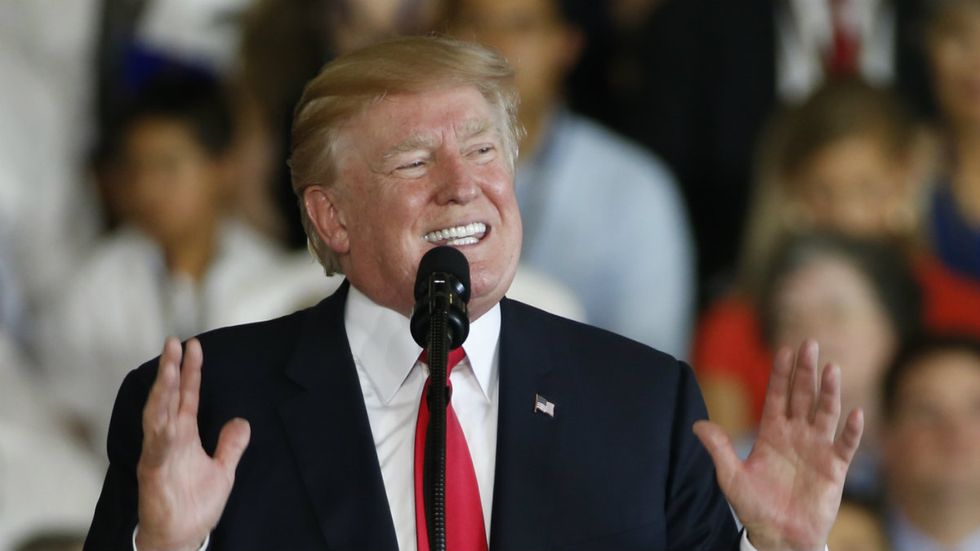
© 2024 Blaze Media LLC. All rights reserved.
We gave you President Trump’s best foreign policy maneuvers, and now it’s time to constructively criticize the first year of the Trump administration. Here are President Trump’s biggest foreign policy missteps in year one.
1. Delivering the Middle East to Iran.
President Trump should be applauded for swiftly defeating the Islamic State terror group. But in doing so, the U.S.-led coalition rolled out the red carpet for Iran to take over the region. The lack of strategic thinking has led to a situation in which the caliphatist regime in Tehran now asserts primary control over Yemen, Lebanon, Syria, Iraq, and other regional actors.
2. Continuing the never-ending whack-a-mole strategy.
President Trump’s new national security strategy promises to rededicate efforts in the ideological battlespace. Let’s hope his team follows through with that agenda. In year one, the president continued to play an Obama-era strategy of jihadi whack-a-mole in several nations. Instead of going after the global jihadist ideology, the American strategy instead targets specific groups.
3. Letting the Muslim Brotherhood off the hook.
The Muslim Brotherhood has become a global menace, serving as the chief incubator for jihadist groups worldwide. Its alumni include a who’s who of terror masterminds, like Osama bin Laden and ISIS “caliph” Abu Bakr al-Baghdadi. Yet, for reasons unknown, the Trump administration has not chosen to designate the Brotherhood, or any of its affiliates (other than Hamas), as terrorist organizations.
4. Appointing weak cabinet officials.
New to The Swamp, President Trump appointed cabinet officials whom he thought would carry out the mandate upon which he was duly elected. But in Washington, government officials play by different rules. Rex Tillerson has acted as a rogue secretary of state, while other top officials have attempted to convince the president to betray his chief campaign promises. But the president has largely ignored their advice, as he’s targeted Iran, left the Paris climate accords, and recognized Jerusalem as Israel’s capital, contrary to the advice of many cabinet members.
5. Continuing to stay close with Erdogan’s Turkey.
Turkey has abandoned the legacy of its secular founding and moves further and further toward an Islamic totalitarian model that promotes policies antithetical to U.S. interests. Not only does Ankara routinely violate the human rights of its own citizens, but the Erdogan regime has cozied up with American adversaries such as Iran and Russia.
President Recep Tayyip Erdogan, the leader of our supposed NATO ally, shows no respect for America and its laws. Several times this year, his security detail attacked peaceful demonstrators who were protesting Turkey’s policies. In August, 15 members of his security detail were charged in U.S. courts for committing several acts of violence.
6. Keeping a U.S. presence in Qatar.
Qatar continues to support Sunni jihadist groups and the Iranian regime, but U.S. policy has not reflected the fact that the small Gulf state is acting in opposition to American interests. So long as Al Udeid Air Base remains a central point for U.S. personnel, Qatar can use U.S. backing as a shield while it fans the flames of terror throughout the region.
7. Abandoning the Kurds.
In September, over 90 percent of Iraqi Kurds voted for a referendum in favor of declaring an independent state of Kurdistan. At CR, we argued that a Kurdistan in northern Iraq would blossom into a secular, capitalist democracy that would become a stalwart ally of the United States and a partner against radical Islamic terror.
Kurdish statehood ambitions have not come to fruition, after the State Department waged a forceful campaign backing the central government in Baghdad. Now, Iraq remains a centralized sectarian authority that continues to move further into Iran’s orbit.
8. No progress on the wall.
We’re almost one full year into the Trump administration, and there hasn’t been any progress on the president’s campaign promise to build a wall to enhance U.S. border security. An unprotected southern border creates a massive vulnerability in our national security.
9. Letting the courts control immigration policy.
Federal court rulings continue to usurp the commander-in-chief’s power to secure the nation. Some have argued that the president has not taken an aggressive enough line in battling back against rogue courts that are forcing the U.S. to absorb Middle Eastern migrants.
10. Keeping the Iran deal (for now).
Though the commander-in-chief has done a tremendous amount to ramp up the pressure on Iran and its proxy in Hezbollah, President Trump has not yet decided to leave the Iran nuclear deal for good. He faces another waiver deadline on January 15. Will the president continue to punt the decision, or will he axe the deal once and for all?
Click here for President Trump’s 10 best foreign policy decisions of 2017
#mc_embed_signup{background:#fff; clear:left; font:14px;}
/* Add your own MailChimp form style overrides in your site stylesheet or in this style block.
We recommend moving this block and the preceding CSS link to the HEAD of your HTML file. */
Want to leave a tip?
We answer to you. Help keep our content free of advertisers and big tech censorship by leaving a tip today.
Want to join the conversation?
Already a subscriber?
more stories
Sign up for the Blaze newsletter
By signing up, you agree to our Privacy Policy and Terms of Use, and agree to receive content that may sometimes include advertisements. You may opt out at any time.
© 2024 Blaze Media LLC. All rights reserved.
Get the stories that matter most delivered directly to your inbox.
By signing up, you agree to our Privacy Policy and Terms of Use, and agree to receive content that may sometimes include advertisements. You may opt out at any time.


